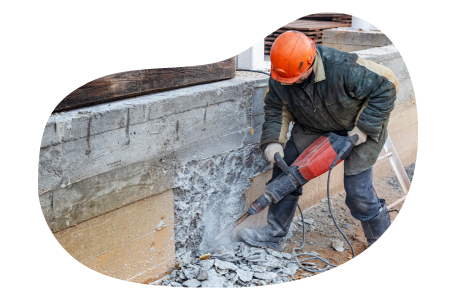
Why do demolition contractors need insurance?
Demolition is one of the most dangerous jobs in construction, which makes insurance essential. Business insurance can pay for medical bills if someone is injured by falling debris, or legal costs if a client sues over a project delay. State laws, contracts, and permits will often require proof of coverage.

Get insured quickly
With Insureon, most demolition contractors can get proof of insurance the same day they apply for quotes.
Our licensed agents can help you find the right coverage for your risks and your budget.
What types of insurance coverage do demolition contractors need?
These insurance policies cover the top risks faced by demolition contractors.
General liability insurance
Commercial general liability insurance covers third-party risks, such as falling debris that hits a car or a passerby. It's often required for demolition permits, licenses, and contracts.
- Bodily injuries from accidents
- Damage to someone else's property
- Defamation lawsuits
Business owner's policy
A BOP bundles general liability and commercial property insurance at a discount. It's often the most cost-effective policy for demolition contractors who have an office.
- Accidental bodily injuries
- Damage to someone else's property
- Stolen or damaged business property
Workers’ compensation insurance
Most states require workers' comp for wrecking companies that have employees. It also protects sole proprietors from work-related medical bills that health insurance might deny.
- Employee medical expenses
- Disability benefits
- Lawsuits from employee injuries
Commercial auto insurance
This policy helps pay for legal fees and damages if a demolition company's vehicle is involved in an accident. Most states require this coverage for vehicles owned by a business.
- Property damage caused by a work vehicle
- Medical costs if another person is injured
- Vehicle vandalism and theft
Contractor’s tools and equipment insurance
This policy helps pay for repair or replacement of jackhammers, pry bars, cutting torches, and other tools if they are lost, stolen, or damaged. It's a type of inland marine insurance.
- Tools valued at under $10,000
- Newer mobile equipment
- Items stored off-site
Professional liability insurance
A professional liability insurance policy covers legal costs if a demolition contractor is sued for a professional mistake or oversight. It's also called errors and omissions insurance (E&O).
- Project delays
- Payment disputes
- Accusations of poor workmanship
How much is demolition contractor insurance?

A company that does building tear-downs will pay more for insurance than a general contractor who does partial removals during home renovations.
Factors that can affect a contractor's insurance premiums include:
- Type of demolition work you do
- Value of your business property
- Business size, location, and revenue
- Types of insurance purchased
- Policy limits and deductibles
- Any endorsements, such as an additional insured
- Claims history
How do I get demolition contractor insurance?
It’s easy to get insurance coverage and surety bonds as a demolition contractor if you have your business information on hand. Our application will ask for basic facts about your company, such as revenue and number of employees. Small business owners can buy online and get a certificate of insurance with Insureon in three easy steps:
- Complete a free online application.
- Compare insurance quotes and choose your policies.
- Pay for your policies and download a certificate.
Insureon's licensed agents work with top-rated insurance companies to find the right coverage for your demolition business, whether you work independently or with employees or subcontractors.
Verified business insurance reviews
Hear from customers like you who purchased small business insurance.
FAQs about business insurance for demolition contractors
Review answers to frequently asked questions about demolition insurance requirements and licensing.
Do I need a license, permit, or bond for my demolition business?
Demolition contractors typically need a license and permit to comply with state laws and local regulations. To obtain them, you usually need to be bonded and insured, and also submit a plan for waste management or debris removal.
Here are several examples of what you might need:
- Business license. To form a business, you'll need to get a business license and register with your local government.
- Contractor's license. In most states, you'll need a contractor's license to do demolition work. You'll likely need to be a certain age, have a specific amount of experience, pass an exam, pay a fee, and show proof of insurance or a bond.
- Demolition permit. Demolition contractors will need a permit from their local building department before demolishing a structure or removing part of it, like a garage or pool.
- Additional permits. You might also need permits for work that involves hazardous materials, equipment that releases pollutants, or excavation, all depending on your local regulations.
Even when it's not required, a license or certification can help elevate your business above the competition when trying to get a contract or win a bid.
For example, you could get trained as a Certified Demolition Technician (CDT) or a Demolition Supervisor (CDS) through the National Demolition Association (NDA).
Does demolition insurance cover pre-existing structural issues?
No, pre-existing structural issues are generally excluded from demolition insurance policies. Your policy is designed to pay for accidents and other incidents that are related to your demolition work, not building damage or deterioration that happened in the past.
Your policy likely has exclusions for:
- Wear and tear
- Lack of proper maintenance
- Intentional damage
What factors affect the cost of demolition contractor insurance?
Factors that underwriters consider when calculating the cost of demolition insurance include:
- Business size. In general, bigger businesses are more likely to make a claim on their policy, so they will cost more to insure.
- Annual revenue. Companies with higher annual revenues are associated with more frequent claims and pay higher premiums.
- Number of employees. When you have more employees, there's an increased risk of a worker getting injured or causing an accident.
- Project type and scope. Whether you take on larger projects like total demolition or smaller projects like interior demolition will also affect your premium.
- Location. Demolition projects in areas with a lot of foot traffic will cost more to insure, as will projects in areas with expensive property values or high crime rates.
- Tools and equipment used. Your insurance premiums will vary depending on whether you use heavy machinery, small manual tools, or explosives for demolition.
- Policy limits and deductibles. You can save money on your premiums by opting for higher deductibles or lower limits, but make sure you have enough protection to cover a costly demolition insurance claim.
- Years of experience. Experienced contractors who have learned how to do their job safely and professionally will cost less to insure.
- Claims history. If your business has demonstrated a strong safety record and has a clean history of claims, you can expect lower insurance rates.
What other types of insurance should typically be included in demolition contractor insurance?
Demolition contractors often rely on other types of construction insurance as part of a comprehensive risk management strategy:
- Commercial property insurance covers your office and its contents, including computers, furniture, and equipment stored at your business address. If you don't have an office, you can buy business personal property (BPP) coverage to protect the items that belong to your business instead.
- Inland marine insurance protects business property that travels to jobsites, including your demolition equipment. It also covers items in transit and stored off-site.
- Products-completed operations coverage covers any harm that arises from your demolition project after your business has left the site, such as water damage from a leaking utility pipe.
- Contractors pollution liability insurance pays for cleanup costs and legal fees related to pollution, such as asbestos exposure or runoff from a demolition site.
- Commercial umbrella insurance activates to provide coverage when your underlying general liability insurance, commercial auto insurance, or employer's liability insurance policy reaches the limit on a claim. You can also buy excess liability insurance to boost a specific policy, usually general liability or professional liability insurance.
Our insurance agents can help you find the right policies for your risks and answer any questions about coverage.
